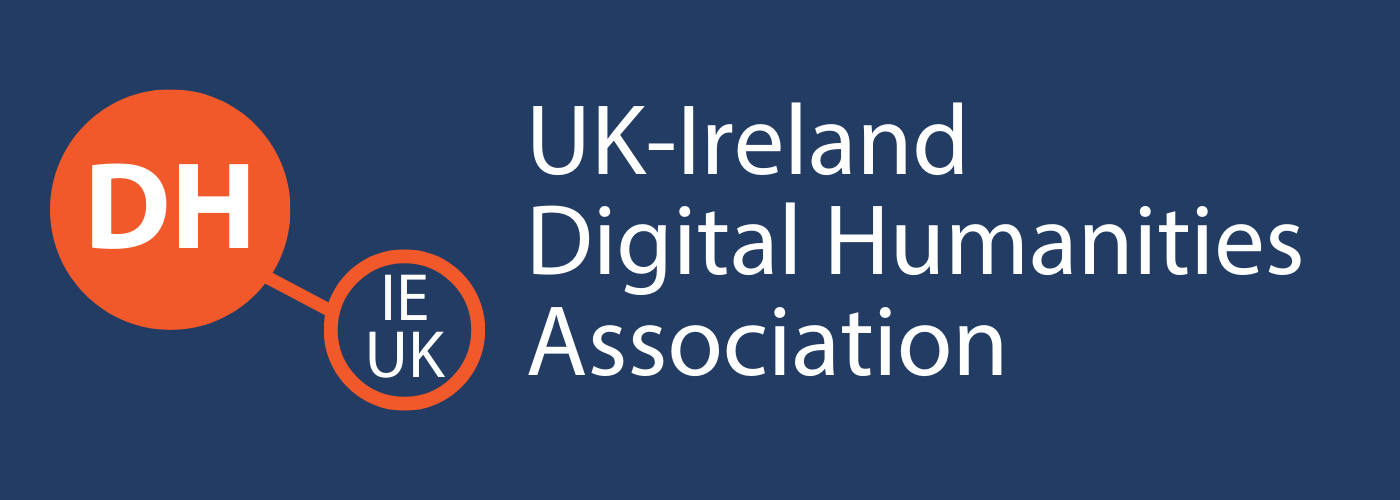Community Interest Groups (CIGs)
Call for ProposalsAssociation Overview
The UK-Ireland Digital Humanities Association aims to build a collaborative vision for the field, and create new and sustainable long-term partnerships in alignment with the international community.
The Association seeks to nurture the capacity for excellent research and teaching in digital humanities, to establish and sustain more effective connections with sectors outside higher education (notably Galleries, Libraries, Archives and Museums as well as the creative industries), and to create new pathways for collaboration. The Association builds on existing partnerships and brings together different stakeholders to consider and critically interrogate the concepts of sustainability, inclusivity, training, advocacy and career progression, among other questions that are central to the field.
The Core Values of the Association are:
- Inclusivity
- Community
- Collaboration
- Sustainability
- Openness and transparency
- Advocacy and action
Community Interest Groups
Community interest groups (CIGs) are community-driven groups which are organised around an existing community of practice, a specific research interest, or a salient issue within the digital humanities community. These groups will serve as one of the primary vehicles for community building within the Association. They will help the Association become more inclusive, collaborative, and sustainable by providing spaces that respond to community needs.
CIGs will be created in response to expressed interest from within the digital humanities community. They are meant to be flexible, so that CIGs can emerge, transform and disband as priorities change within the field. There is no limit to the number of people who can participate in a CIG and their form and processes can be tailored to meet the needs of the specific group. It is expected that CIGs will run for at least 18 months in the first instance, with the opportunity to continue beyond that if the members would like it to.
CIGs will receive support from the Association, including use of the Association’s social media channels, a place on the Association’s website, and access to the Association Collective as a resource in case of management challenges or questions. The Association will also offer CIGs the opportunity to participate in Association events, regular chances to feed back on issues related to the CIG’s area of interest, and formal opportunities to collaborate with other CIGs and external organisations.
Beyond this support, CIGs are expected to be self-organising and managed. There should be clear expectations about the level of commitment and work required to sustain the CIG and the Association advises that these expectations be set with an eye to sustainability.
Application Process
Proposals for CIGs should include information about the organisers and potential participants, the motivation behind the group, its objects and proposed activities, and a short abstract.
The Association will evaluate proposals based on the following criteria. Where the Association lacks the expertise to evaluate a specific proposal, they will seek input from outside experts in the digital humanities community.
- Does the CIG address a clearly articulated need or interest within the digital humanities community and make clear how it would benefit members of the community in Ireland and the UK?
- Does the CIG advance at least one of the Association’s Core Values?
- Do the goals and activities outlined in the proposal address the purpose of the CIG, appear achievable and reflect a reasonable time commitment for organisers and participants?
Proposals for a CIG should be submitted to uk-ie.digitalhumanities@sas.ac.uk as a single PDF document using the template below by 5:00 PM GMT on Friday, 17 February 2023. If similar proposals are submitted, the Association might combine proposals.
Organisers can expect to hear the result of their application by Friday, 17 March 2023.
If you have any questions about the process, please email uk-ie.digitalhumanities@sas.ac.uk.
Community Interest Group (CIG)
Proposal Template
Working Group Name:
Please choose a name for your group that reflects its aims.
Coordinators:
In order to ensure groups are sustainable, we ask that each proposal name at least two (and no more than four) coordinators. Please include their name, institution (if applicable), and email address. These people will be the main point of contact for the group.
We encourage applications that reflect the geographic and institutional diversity of DH in the UK and Ireland – applications that include coordinators from both Ireland and the UK will be viewed favourably.
Potential participants:
Who do you think will be interested in participating in this group? Some ways to think about who might be interested include: people at particular career stages (graduate students, early career researchers), people working in particular institutions (universities, start-ups, GLAM), or people working in particular roles (research software engineers, exhibit designers, project managers). You could also consider who might be interested in the question or issue the group addresses.
Abstract (250 words):
Please provide a short summary of the group. Think about the text that would go on the ‘About’ page of the group’s website.
Relevance (500-750 words):
Please explain the reasons behind forming this group. What community of practice, research question or salient issue does it address? How do you see it contributing to the digital humanities community in Ireland and the UK?
Aims & Activities (500-750 words):
Please explain a few of the aims you have for the group and the activities you anticipate it will run. Possible aims and activities could include: experimenting with a new technology, creating a set of best practices, or coordinating activism around a specific issue. Goals and activities should be concrete and achievable.
Please make it clear how these aims and activities advance the Core Values of the Association.
Please reflect on issues of sustainability. How much time will be required to reach these aims or deliver these activities? Will these require additional funding or resources? Are there existing organisations that you could partner with to reach the group’s goals?
